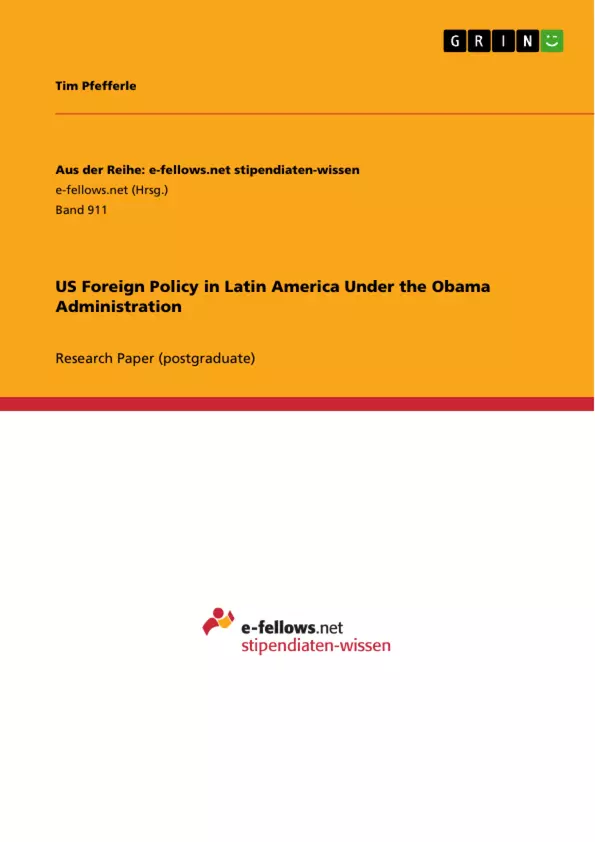This essay analyzes the conduct of US foreign policy towards Latin America under President Obama from three perspectives. First, the ideologic dimensions will be covered through an analysis of Cuba policy under the Obama administration. Secondly, security policy will be analyzed with an investigation of relations with Mexico and Colombia. Lastly, the essay will cover the Obama administration's position vis-a-vis neoliberal economic policies in Latin America.
Inhaltsverzeichnis (Table of Contents)
- Introduction
- Obama and the Americas: An Overview
- Ideology and Cuba: Empty Rhetoric?
- Securing the Americas: Mexico and Colombia
Zielsetzung und Themenschwerpunkte (Objectives and Key Themes)
This essay aims to provide an overview of US foreign policy towards Latin America since 2009, focusing on three key dimensions: ideology, security, and economic hegemony.
- The evolution of US-Cuba relations as a reflection of ideological foundations.
- The security dimension, illustrated by the US-Mexico and US-Colombia relationships.
- The Obama administration's approach to neoliberal economic policies in Latin America.
- The constraints faced by US foreign policy makers in achieving their objectives.
- The comparison of Obama's foreign policy to that of the previous Bush administration.
Zusammenfassung der Kapitel (Chapter Summaries)
The introduction presents the context of Barack Obama's presidency in relation to US foreign policy towards Latin America, setting the stage for analyzing his approach. It contrasts the expectations of a more multilateral and less coercive relationship with the legacy of the Bush administration.
The second chapter provides an overview of US foreign policy in Latin America during the Bush era, highlighting a shift towards a predominantly military engagement with Latin America under the lens of the "war on terror." It then discusses the expectations raised by Obama's election and his initial signals of a possible deviation from previous policies.
The third chapter analyzes the Obama administration's policy towards Cuba, comparing it to the campaign rhetoric and highlighting the disconnect between expectations and actual implementation. It emphasizes the continued reliance on the economic embargo and the influence of the Cuban American community in shaping US foreign policy.
The fourth chapter examines the Obama administration's security policy in Latin America, focusing on the War on Drugs in Mexico and the US-Colombia relationship. It critiques the Mérida Initiative as a continuation of the Bush administration's strategy, while recognizing some attempts to move beyond a purely military approach. This chapter also explores the potential for human rights abuses associated with the initiative.
Schlüsselwörter (Keywords)
The primary keywords and focus topics of this text include: US foreign policy, Latin America, Barack Obama, Cuba, Mexico, Colombia, Mérida Initiative, War on Drugs, neoliberal economic policies, ideological foundations, security dimension, economic hegemony, constraints, comparison, Bush administration.
Frequently Asked Questions
How did Obama's Latin America policy differ from Bush's?
While Bush focused on a military approach through the "war on terror," Obama initially signaled a more multilateral and less coercive relationship, though many security strategies remained similar.
What was the Obama administration's stance on Cuba?
Despite rhetoric about change, the administration largely maintained the economic embargo, influenced by the domestic political pressure of the Cuban American community.
What is the Mérida Initiative?
It is a security cooperation agreement between the US, Mexico, and Central American countries to combat drug trafficking and organized crime, continued under Obama.
How did the "War on Drugs" impact US-Mexico relations?
It led to deep security cooperation but also faced criticism regarding human rights abuses and the effectiveness of a primarily military-led strategy.
What was Obama's approach to neoliberal economics in the region?
The administration generally supported neoliberal economic policies and economic hegemony, though it faced challenges from Latin American nations seeking more autonomy.
- Quote paper
- Tim Pfefferle (Author), 2014, US Foreign Policy in Latin America Under the Obama Administration, Munich, GRIN Verlag, https://www.grin.com/document/272174



